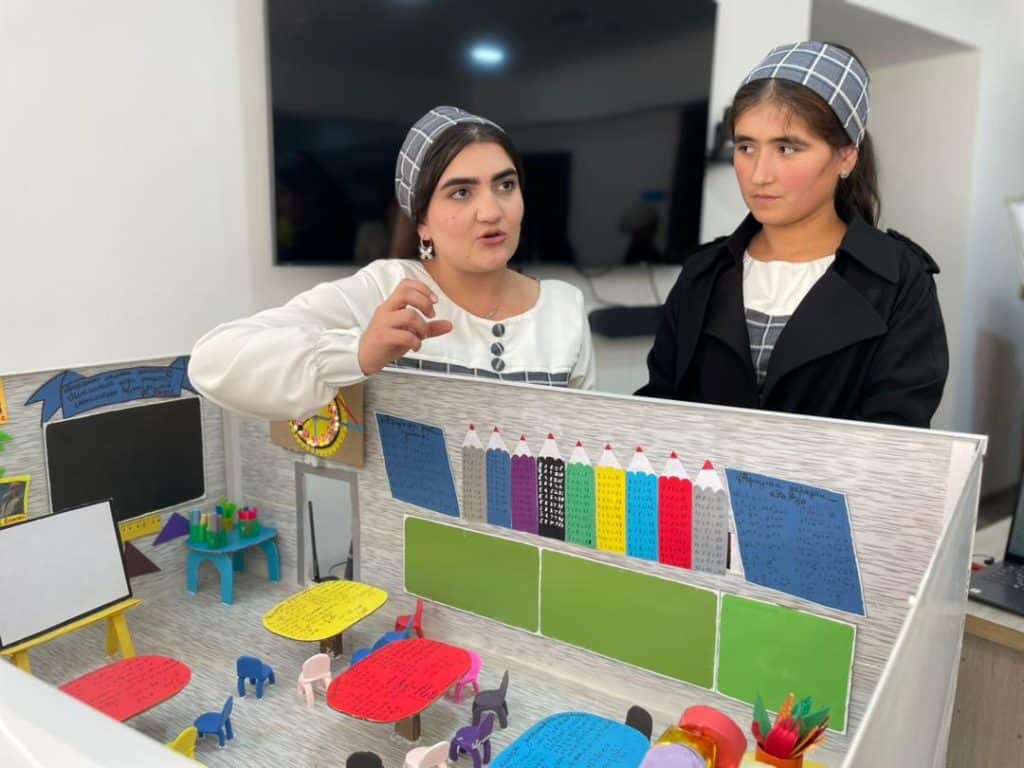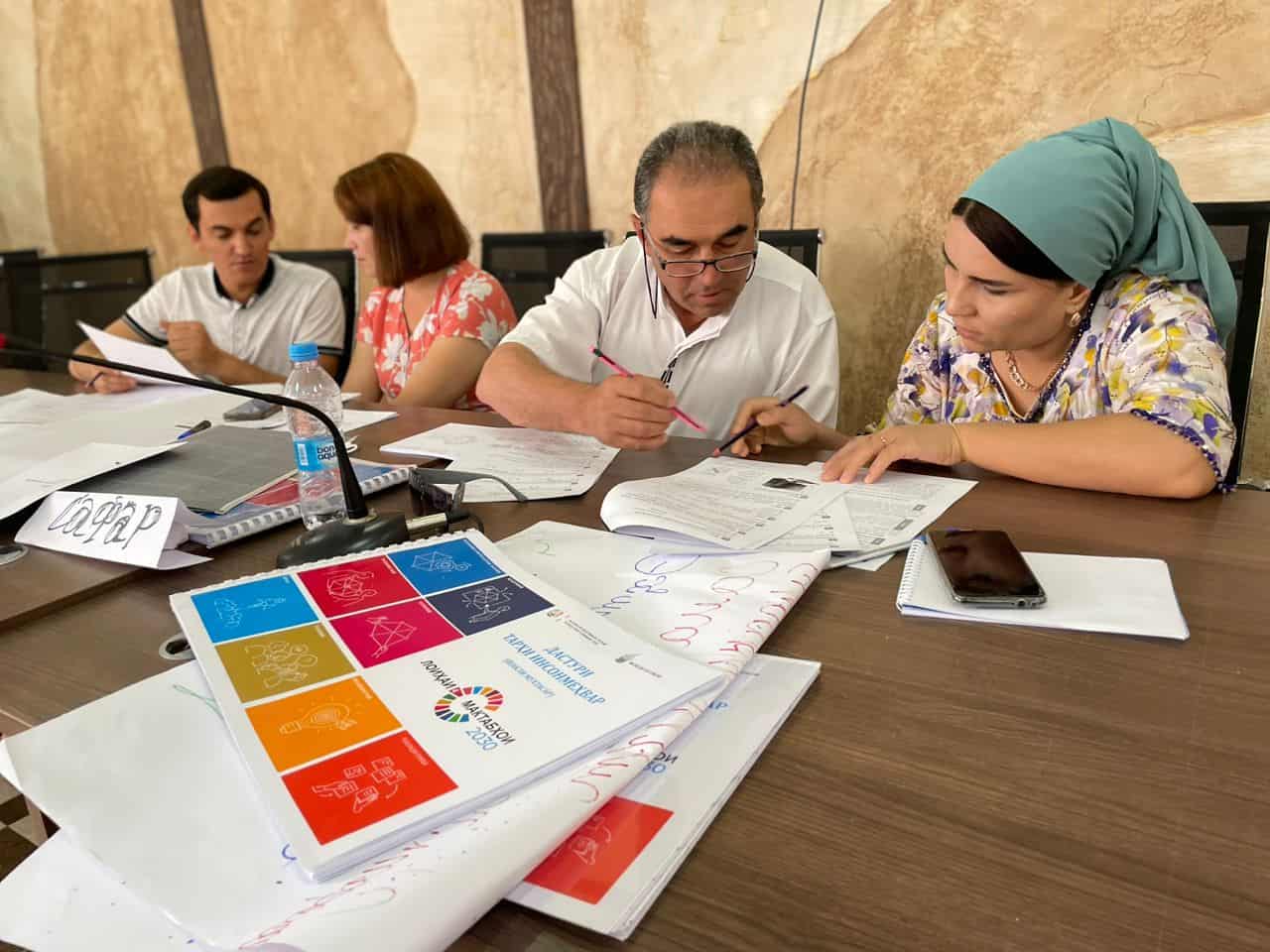Between September and November, 400 teachers from across Tajikistan’s four provinces took part in Schools2030 Tajikistan’s HCD trainings. Hailing from 100 government schools, the teachers took part in the workshops to address challenges faced by students at pre-school, primary and secondary school levels.
The HCD workshops commenced with the launch and explore phase where teachers were given an opportunity to think about what challenges their students might be facing, both through interviewing students and other stakeholders but also by collecting and analysing data with Schools2030’s assessment tools. In the next two phases – define and generate – teachers were able to further examine the challenges they identified, as well as any constraints to their successful ability to teach. This paved the way for them to ideate suitable solutions that are inclusive, contextually relevant and sustainable. Below are examples from five of the teachers who attended the workshops.

Nature is our cure
Haydarov Namoz, Biology teacher, School #4 Khuroson district, Khatlon
Challenge: Grade 9 students face challenges applying theoretical knowledge in practice.
Response: The idea aims at providing opportunities for students to apply theoretical knowledge practically. One way they do this is by making various kinds of jams and salads from local fruits and vegetables – through this they learn about the nutritional properties of the food items. The process also supports improved maths skills, collaboration as the students work in groups, and enhances respect for the environment and nature.

Creative Children
Bakmatova Bibirokiya, Primary School teacher, School #4, Levakant district, Khatlon
Challenge: Students struggle to understand meaning in stories and with basic numeracy activities like counting.
Response: The classroom is divided into four parts: story world, entertainment garden, introduction to culture, travel through the marvels of the world. Through these engaging activities, students can explore the meaning of stories in different ways which aims to improve their understanding. They are also encouraged to undertake activities to improve numeracy using creative and colourful low-cost hand-made resources that are based on the curriculum.

Young mathematicians
Jalolova Sarvinoz, Maths teacher, School #34, Tursunsoza, DRS
Challenge: Students struggle to remain active and engaged throughout the lesson
Response: This idea works by organising the classroom in a way that helps students to remain focused and engaged throughout the lesson. This is done by decorating the classroom with math resources and formulas that are engaging, accessible and creative. Rather than sitting in a traditional way, students sit in groups of 4-5 and are assigned different types of activities related to improving counting, cooperation and leadership skills., amongst others.

Chemistry in our lives
Hamidova Saltanat, Chemistry teacher, School #70, Danghara district, Khatlon
Challenge: Most students are unable to apply theoretical work into practice. They cannot express their points of view about their experiences or logically separate the concepts of substances and chemical elements in biological processes. They struggle to learn the necessary information about the world of plants, animals and people and do not have enough information about the chemical elements present in the human body.
Response: Students in grades 8 and 9 were involved in more practical lessons and built a skeleton in order to study the role of chemical elements in the human body and the relationship between chemistry and biology. The results so far have shown the students have improved their understanding of chemical and biological experiments and have become more interested and competitive in learning topics.

Young scientists
Tupalangova Gulnigor, Algebra teacher, School # 10, Vose district, Khatlon
Challenge: Students struggle to solve problems based on formulas, including quadratic equations, quadratic functions and graphs of quadratic functions.
Response: The teacher has designed a device with many types of geometrical shapes which helps students visualise the mathematical functions in 3D spaces and therefore improve their understanding.
Each of these teachers and many others were able to present their prototypes and receive genuine feedback from their colleagues, trainers and learning partners. The overall process was a great opportunity for teachers to demonstrate their creativity and innovative skills in tackling students’ learning challenges. It also encouraged teachers to start thinking of themselves as agents of change in education, with the power to shape student outcomes for the better through through low-cost and accessible ideas.
“The HCD workshops awakened me to think about my students’ learning challenges and come up with solutions which was not the case until I presented my design solution today. I can surely say that after applying the HCD toolkit and learned methods during the test phase in my class some of my students had visible progress”, says Nuriddinzoda Shahlo, one of the teachers from Khatlon region.
The team at Schools2030 Tajikistan also noted that teachers this year appeared to have a better understanding of the methodology and importance of HCD, and its potential impact on student learning. More than 300 teachers have so far come up with ideas that have the potential to make a significant difference in their contexts. The impact of their prototypes will be assessed over the coming months, and those with the most impact will be identified for showcasing in the Schools2030 Tajikistan regional and national showcases, and will be considered for incubation and scale by the global team.
Watch the video of Schools2030 Tajikistan’s National Showcase Event from May 2023
